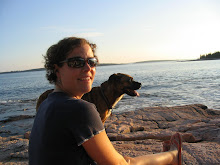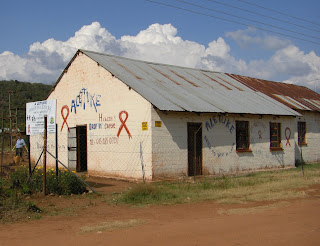I’ve been in South Africa for nine months now. The house I live in is quite modern by local standards. My Mom is a teacher, paid by the government, which allows her a reasonably comfortable life. We have a nice television with Satellite reception, refrigerator, electric range with oven, indoor plumbing with hot water and a flush toilet. We also have a borehole, or a shallow well, which provides us with a back-up water source for when the street pipes run dry. As of today, the street has been dry for over a month. Gutter collectors have been empty since before winter (June) and we haven’t seen rain since April. In the mean time the municipality trucks in water to community holding tanks for people to fetch what they need. Our borehole water is very salty so we must fetch only our drinking water. For that I am grateful.
I sit in my living room on matching furniture and wonder if I could, would I choose to live more remote, without appliances or electricity, my computer or cell phone? What if I lived in a place where I couldn’t count on their English and I had to rely only on my Sepedi? Would I have it in me to live further out of my comfort zone?
There are things here that I have no problem living without. And the longer I’m here the easier and more normal it becomes. I haven’t used a napkin, paper towel, zip-lock bag or aluminum foil since I’ve been here. I can count the meals I’ve used a fork to eat with. There isn’t a butter knife in the house (the back of a spoon works great) and a drawer organizer is the furthest thing from our kitchen. You have to pay for plastic bags at the grocery store so my Mom showed me how to fold and tie one up in a tiny bundle and always have one in my bag. I’m glad for that about once a week. Pens and pencils are hard to come by so I’m much better about keeping my pens until they are out of ink. I keep food boxes to make homemade postcards and projects for work, pieces of string and wire, wash out food jars and recycle the nice paper bags that sugar and flour come in. At the point in which a typical American would toss a dishcloth into the trash, we use it until it almost falls apart and then it continues to live out the rest of its life as a cleaning rag. Old panty hose are used for buffing floors and shoes. I watch my coworkers blow their nose on their child’s outgrown infant t-shirt. We save the oil from cooking. We re-use the vinegar used to boil salt off the kettle heating coil. We collect rain from the gutters for bathing, washing clothes and cooking. I will use the plastic wrap from my lettuce to wrap a leftover. I use the toilet paper bag for my trashcan. And even then I dump it out and use it again. You know the wax molded at the bottom of the candle holder? There’s a use for that too. If you look inside my Mom’s pillow there’s years of outgrown, ripped and recycled clothing. It’s a little lumpy for my taste but it’s the one she chooses to sleep with every night. I use the communal cup at the drum of drinking water. I pee in a bucket in my room at night. It’s pit toilets everywhere you go so don’t forget to keep toilet paper on you at all times.
The list goes on and on with the everyday little things that are truly everyday and little things. They were adjustments to begin with but living so simply has it’s own rewards. I wonder to what degree I will fall from this way of living when I return home.
In contrast to the life style I’ve embraced there are parts of my life here that have pushed me to my limits and beyond, frustrated me, brought me to tears and forced me to dig deep for strength I wasn’t sure was there. As a young, independent woman who’s made every decision for herself up to this point in time, living in an extremely patriarchal culture has proven very difficult. The hardest part for me is that the women who live in these rural communities, rich with tradition, accept the absence of choice and independence in their lives. To them, there is no absence, it just is. They know no other way. Boys and girls are separated in their chores, where they sit in church, stand at morning assembly before school and their roles in the home from a very young age. Simply the act of paying labola, a bride price, puts a woman in a position of being property and the man, owner. When I talk to people here and point out what I see their answer is always, “that’s the way it’s always been.” Then my response is usually, “yes, but it doesn’t mean it’s right.”
Because of these definitive roles whenever I’m at a celebration of some kind I find myself doing dishes, serving tea, cooking, cleaning and spending my time with the women doing what they do best, serve. I have to bite my tongue a lot and wonder if these women, who have never lived a day not servicing “their man,” long in their hearts for the choices I’ve been blessed with.
With a little gentle probing many women have opened up to me and talked about their relationships with their husbands. Some don’t even share the same bed. Most women speak of their husbands’ infidelities as if it’s just a part of the marriage package. Almost all are forced to “perform” on demand and receive no sexual pleasure from their husband. But their strength is for their children and grandchildren they are raising single handedly. It’s not an unfamiliar sight to see a woman in her sixties or seventies washing a mountain of laundry by hand with a little one tied to her back. These women inspire me while at the same time my insides weep for them.
The language barrier continues to challenge me everyday. What once was a novelty has become a daily struggle. My use of Sepedi is what often brings me closer to the people around me. Yet, their use of Sepedi is what pushes me away. I more often choose to be by myself then sit in a room with other people and feel alone. My Sepedi grows stronger everyday but despite my efforts I can understand very little of their conversations. The speed at which they speak is impossible for me to pick out words. And to complicate matters worse, the mother tongue of the village I live in is not the language I am learning. So unless I am engaged in a one on one conversation with someone who is willing to speak slowly and clearly for my understanding, I continue to sit alone. Some would say this should be a motivator to learn the language better. But the truth is, no matter how badly you want to learn to swim you can’t start in the deep end.
These daily struggles are invisible to the people around me. The thick skin I came here with is now gone. My breaking point now lives on the surface of my emotions. I am more raw and real then I ever have been. Now, it’s all about protecting myself and being proactive. What do I need right now? Where do I need to be? Who do I need to talk to? I’ve made decisions about work to maintain my happiness and productivity. I’ve had numerous conversations with my host Mom so she can understand my challenges and reactions more clearly and be a support for me, a role she has truly embraced. I know what works for me and what doesn’t. I know when to walk away and when to stay. I’m actually living in a survival mode now. If I don’t do the things necessary to protect myself emotionally and mentally I won’t be able to stay here. I often feel weak when I make the decision to get up and leave a situation but then again I feel stronger than ever because I’m acting on my behalf and doing what’s best for me without harming anyone else and I consider that strength. This may be a phase of adjustment I’m growing through. Sometimes it feels like a valley in the rollercoaster experience that Peace Corps is. But knowing yourself better than you ever have before would qualify as a peak. I believe the Universe is setting me up for success when I see the miracles all around me; my host Mom, David, my supervisor, the wonderful people I work with, the support I have from home and the lessons I embrace everyday.
 These are her two sisters. Mokgaetji is the oldest in the blue. I call her Mma Mogolo (older mother) and Raisebe is the youngest in the pink sleeves. I call her Mmane (aunt or younger mother). My Mom is the middle child. They also had a brother who passed away. Raised by a single mother all four children grew up to be educators.
These are her two sisters. Mokgaetji is the oldest in the blue. I call her Mma Mogolo (older mother) and Raisebe is the youngest in the pink sleeves. I call her Mmane (aunt or younger mother). My Mom is the middle child. They also had a brother who passed away. Raised by a single mother all four children grew up to be educators.  They are preparing food for my birthday party.
They are preparing food for my birthday party.

































